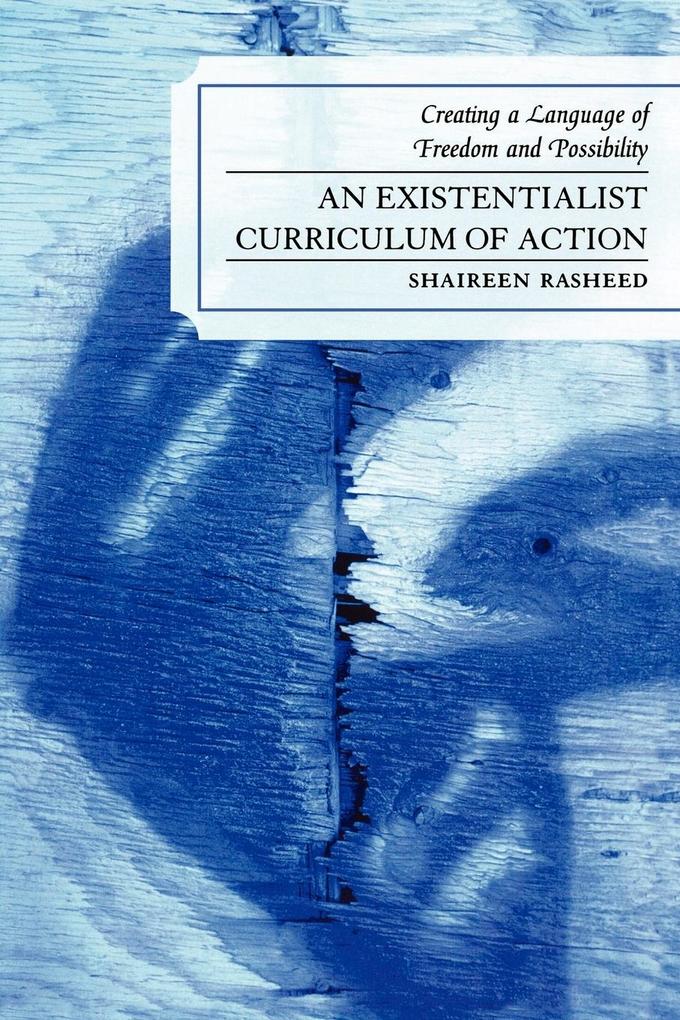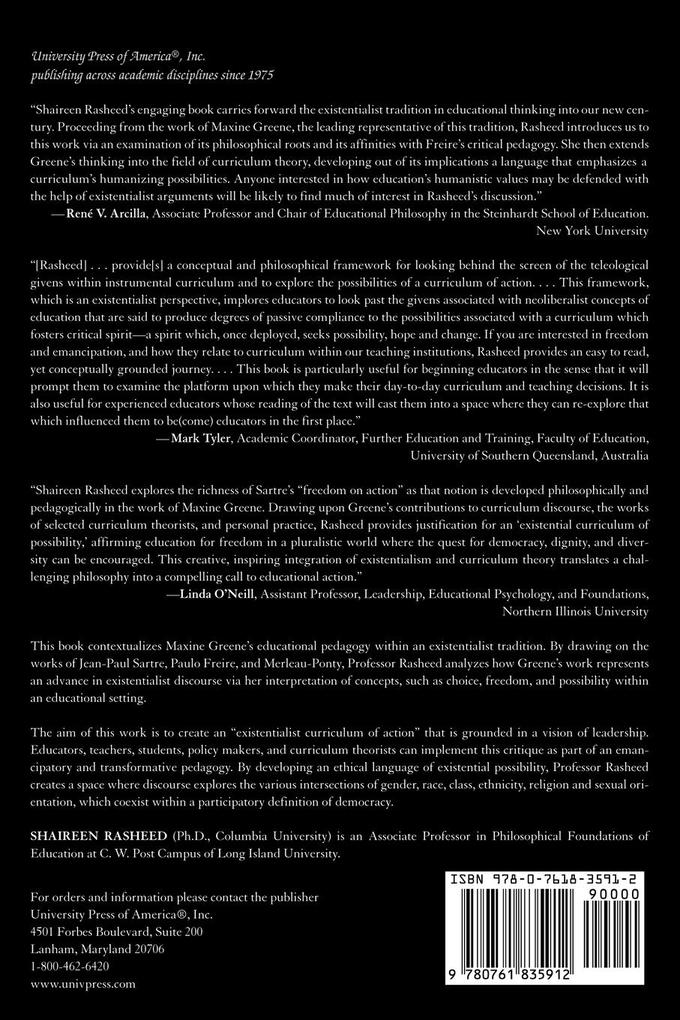
Zustellung: Di, 17.06. - Fr, 20.06.
Versand in 6 Tagen
VersandkostenfreiBestellen & in Filiale abholen:
This book contextualizes Maxine Greene's educational pedagogy within an existentialist tradition. By drawing on the works of Jean-Paul Sartre, Paulo Freire, and Merleau-Ponty, Professor Rasheed analyzes how Greene's work represents an advance in existentialist discourse via her interpretation of concepts, such as choice, freedom, and possibility within an educational setting.
Inhaltsverzeichnis
Part 1 Acknowledgements Part 2 Introduction Chapter 3 Sartre and Greene: Contextualizing Freedom in Action Chapter 4 The Existential Concept of Freedom for Maxine Greene: The Influence of Freire and Merleau-Ponty on Greene's Educational Pedagogy Chapter 5 A Pedagogy of Pluralism: The Literary Reality of Lived Worlds Chapter 6 The Limits of Universality: Delimiting the Standardized Curriculum Chapter 7 Conclusion: Implications for Educators: Creating Curriculums of Action in the Classroom Part 8 Bibliography
Produktdetails
Erscheinungsdatum
20. Dezember 2006
Sprache
englisch
Seitenanzahl
88
Autor/Autorin
Shaireen Rasheed
Verlag/Hersteller
Produktart
kartoniert
Gewicht
142 g
Größe (L/B/H)
229/152/5 mm
ISBN
9780761835912
Entdecken Sie mehr
Pressestimmen
[Rasheed]... provide[s] a conceptual and philosophical framework for looking behind the screen of the teleological givens within instrumental curriculum and to explore the possibilities of a curriculum of action... This framework, which is an existentialist perspective, implores educators to look past the givens associated with neoliberalist concepts of education that are said to produce degrees of passive compliance to the possibilities associated with a curriculum which fosters critical spirit? a spiritwhich, once deployed, seeks possibility, hope and change. If you are interested in freedom and emancipation, and how it relates to curriculum within our teaching institutions, Rasheed provides an easy to read, yet conceptually grounded journey...This book is particularly useful for beginning educators in the sense that it will prompt them to examine the platform upon which they make their day-to-day curriculum and teaching decisions. It is also useful for experienced educators whose reading of the textwill cast them into a space where they can re-explore that which influenced them to be(come) educators in the first place. -- Mark Tyler, Academic Coordinator, Futher Education and Training, Faculty of Education, University of Southern Queensland, Australia International Journal Of Pedagogies and Learning Shaireen Rasheed's engaging book carries forward the existentialist tradition in educational thinking into our new century. Proceeding from the work of Maxine Greene, the leading representative of this tradition, Rasheed introduces us to this work via an examination of its philosophical roots and its affinities with Freire's critical pedagogy. She then extends Greene's thinking into the field of curriculum theory, developing out of its implications a language that emphasizes a curriculum's humanizing possibilities. Anyone interested in how education's humanistic values may be defended with the help of existentialist arguments will be likely to find much of interest in Rasheed's discussion. -- Rene V. Arcilla, Assoc. Professor and Chair of Educational Philosophy in the Steinhardt School of Education, New York University The book provides exercises for educators and their students to help them understand how various influences - political, social and economic - affect the way they teach and learn. With this knowledge, regardless of the regimented curriculum and testing, they still can have the freedom to think for themselves and to come to their own conclusions. Long Island University Magazine Shaireen Rasheed explores the richness of Sartre's "freedom in action" as that notion is developed philosophically and pedagogically in the work of Maxine Greene. Drawing upon Greene's contributions to curriculum discourse, the works of selected curriculum theorists, and personal practice, Rasheed provides justification for an "existential curriculum of possibility," affirming education for freedom in a pluralistic world where the quest for democracy, dignity, and diversity can be encouraged. This creative, inspiring integration of existentialism and curriculum theory translates a challenging philosophy into a compelling call to educational action. -- Linda O'Neill, Asst. Professor, Leadership, Educational Psychology, and Foundations, Northern Illinois University [Rasheed]... provide[s] a conceptual and philosophical framework for looking behind the screen of the teleological givens within instrumental curriculum and to explore the possibilities of a curriculum of action... This framework, which is an existentialist perspective, implores educators to look past the givens associated with neoliberalist concepts of education that are said to produce degrees of passive compliance to the possibilities associated with a curriculum which fosters critical spirit- a spirit which, once deployed, seeks possibility, hope and change. If you are interested in freedom and emancipation, and how it relates to curriculum within our teaching institutions, Rasheed provides an easy to read, yet conceptually grounded journey...This book is particularly useful for beginning educators in the sense that it will prompt them to examine the platform upon which they make their day-to-day curriculum and teaching decisions. It is also useful for experienced educators whose reading of the text will cast them into a space where they can re-explore that which influenced them to be(come) educators in the first place. -- Mark Tyler, Academic Coordinator, Futher Education and Training, Faculty of Education, University of Southern Queensland, Australia International Journal Of Pedagogies and Learning
Bewertungen
0 Bewertungen
Es wurden noch keine Bewertungen abgegeben. Schreiben Sie die erste Bewertung zu "An Existentialist Curriculum of Action" und helfen Sie damit anderen bei der Kaufentscheidung.










